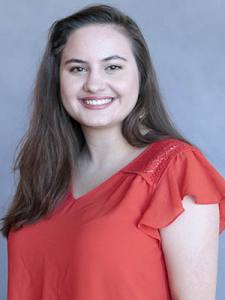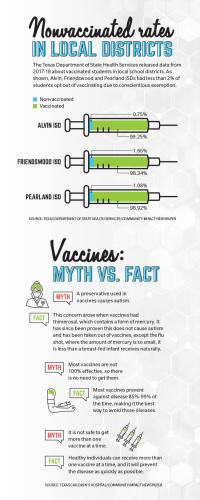As children go back to school, one of the back-to-school rituals is making sure children are vaccinated. However, families can opt out of vaccines for a few reasons, the most common of which is conscientious exemption.
Conscientious exemption allows for parents to exempt their children from vaccinations due to religious beliefs.
Pearland ISD had 1.08% of students who were nonvaccinated due to conscientious exemption, according to 2017-18 data from the Department of State Health Services. This is the main reason parents choose not to vaccinate their children in PISD, Lead Nurse Christy Beck said.
“We can’t make people who don’t believe in vaccines to get one. If ever there was an outbreak, we would have to protect those children,” Beck said.
While districts cannot force parents who exempt their children from getting vaccines to vaccinate their children, there have been instances of parents trying to file an exemption of conscience and later deciding against it at Alvin ISD, Lead Nurse Katrina Weber said. Some parents who are unwilling to vaccinate have reservations about vaccines causing autism, Weber said. The district tries to help the parents work past this feeling, Weber said.
“We try really hard to educate parents,” Weber said.
AISD has a less than 1% of students opt out of vaccines due to conscientious exemption, according to DSHS data.
In 2017-18, Angleton Christian School had over 11% of children unvaccinated due to conscientious exemption. However, private schools are required to follow state guidelines about vaccines just as public schools are, said Kim Green, First Aid Assistant at Eagle Heights Christian Academy.
Eagle Heights is located in Pearland, and did not report any vaccination data in 2017-18, as schools have the option to opt out of reporting. However, the district does not have many parents exempt their children from vaccinations, Green said.
“We just don’t have very many students who have exemptions,” Green said.
Because most students are vaccinated, the school does not place a lot of emphasis on vaccinations, Green said.
“We don’t get an abundance of illnesses. We haven’t seen a major change one way or another,” Green said.
At Eagle Heights, an exemption is typically caused by a parent’s choice, or by parents opting for a different vaccination schedule, Green said.
The DSHS dictates the rules of vaccinations—including when certain vaccines have to be received. This is a common misconception PISD sees, Beck said.
“One of the main things of confusion that I get is that … you need certain things before the first day because that has been set by the [Centers for Disease Control and Prevention] and the state health department. Those aren’t Pearland ISD’s rules,” Beck said.
Beck said one of the reasons PISD has such a high vaccinated population is due to the amount of health-related resources that Pearland offers. AISD also has a large portion of students and schools in the district in Pearland.
“We don’t have a shortcoming of resources in Pearland. There’s a ton of places that can be walked into,” Beck said.
Both Beck and Weber said one downside of a child getting ill with something a vaccine could have prevented is that child will miss out on an educational experience.
For both districts, as well as Friendswood ISD, requiring vaccinations goes back to children’s safety. Friendswood ISD, which had a population of 1.66% who opted out of vaccination due to conscientious exemption, emphasizes the importance of vaccinations, district officials said.
“We want our kids to be safe. Things that used to be prevalent aren’t any more thanks to vaccines,’’ Beck said. “It keeps the community safe, especially for those that can’t receive vaccines for health reasons.”





